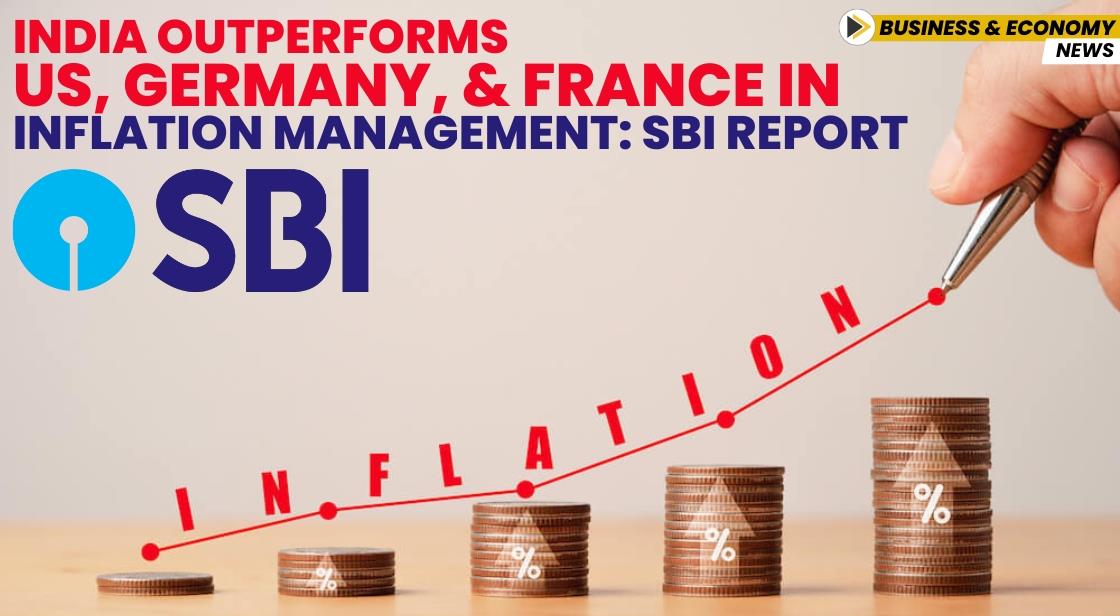India Outperforms US, Germany, and France in Inflation Management: SBI Report

News Synopsis
India has managed inflation much more effectively than advanced economies such as the USA, Germany, and France, according to a research report from the State Bank of India (SBI). The report praises India’s inflation-targeting regime, which has outperformed several global economies in recent years, especially during 2021-2024. While many developed nations have struggled with rising inflation, India has maintained a relatively stable inflation rate, demonstrating the success of its coordinated policy measures.
Government and RBI Coordination: Key to India's Success
The SBI report credits the Reserve Bank of India (RBI), the Indian government, and the banking sector for their close cooperation in managing inflation over the past decade. The synchronization of monetary and fiscal policies has played a vital role in maintaining price stability, especially during the challenging pandemic years.
The report highlights the importance of the country's financial ecosystem, stating, "The success of Inflation Targeting in India is largely a byproduct of a vibrant financial ecosystem where RBI, Government, and the Banks are working closely in unison in ushering in market reforms."
This partnership between the central bank and government has helped ensure effective policy transmission and better control of inflation. The inflation-targeting framework, first implemented in 2016, has enabled the RBI to set and adhere to a clear inflation target of 4%, with a tolerance band of ±2%.
Minimal Deviations from Inflation Targets
One of the standout achievements noted in the report is India’s minimal deviations from its inflation targets between 2021 and 2024. During this period, India recorded some of the lowest deviations compared to global economies like the US, Germany, and France, which have experienced significant inflationary challenges.
The report stated, "India had a largely successful inflation targeting regime. Compared to advanced economies like the USA, Germany, and France." It goes on to emphasize how India's policy measures have kept inflation within acceptable limits while advanced economies have faced more severe economic consequences due to uncontrolled inflation.
Addressing India-Specific Challenges in Pre-Inflation Targeting Era
The report also discusses the challenges India faced in the pre-inflation targeting era, when several factors hindered effective policy transmission. These included:
-
Sustained fiscal dominance, which made it difficult for monetary policy to function independently.
-
A large informal sector that restricted the flow of formal financial services.
-
Significant informal financing channels, which limited the reach of central bank policies.
-
Inefficiencies in the way banks priced their loan products, affecting the transmission of interest rate cuts.
The report elaborates, "Effectiveness of monetary policy in India's pre-Inflation Targeting regime was constrained by several India-specific factors that affected the transmission of policy impulses through the interest rate channel."
Food Inflation and Inflation Expectations
Despite high food inflation, the RBI's inflation targeting has managed to anchor broader inflationary expectations. The report dismisses the notion that headline inflation should exclude food prices, calling such an approach "counterfactual." Instead, it argues that food inflation should be considered, as it can have a spillover effect on core inflation.
The report notes that the RBI's consistent communication of its 4% inflation target has been crucial in anchoring inflation expectations across the broader economy. By reinforcing its commitment to this target, the RBI has helped stabilize inflation, even when food prices have been volatile.
Synchronization of Fiscal and Monetary Policies During the Pandemic
The SBI report underscores the critical role that the synchronization of fiscal and monetary policies played during the COVID-19 pandemic. The Indian government's fiscal response, combined with the RBI's monetary interventions, helped to maintain price stability during one of the most turbulent economic periods in recent history.
The coordinated efforts between the RBI and the central government have proven instrumental in achieving India’s inflation targets, even as other advanced economies like the US and Germany struggled with surging inflationary pressures.
Conclusion: A Strong Monetary Policy Framework
The SBI report reaffirms the strength of India’s monetary policy framework and highlights the effectiveness of its inflation-targeting regime. With close collaboration between the RBI, the government, and banks, India has successfully managed to keep inflation in check, outperforming many advanced economies. The success of India’s inflation control measures during 2021-2024 demonstrates the robustness of its economic policies and the importance of a well-coordinated financial ecosystem in addressing global challenges.
You May Like









